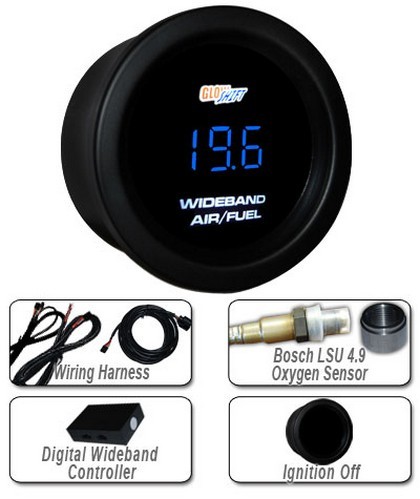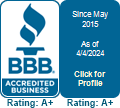Hello, Sign In!
Select Your Vehicle
Select Your Vehicle
Glowshift Blue Digital Wideband Air/Fuel Gauge - With Data Logging Output



Part #: GS-BD02W-DL
$248.70 For each
Free Shipping! *to continental U.S. only
Lettering Color: Blue
Face Color: Black
Gauge Type: Fuel - Air Fuel Ratio

Featured Videos
-
Video Description:So why do you need a transmission temperature gauge? Watch this video to find out! Highlights include:
*At 0:15, we explain the different situations in which you may need a trans temp gauge. -
Video Description:In this video, we tell you about the gauges that we installed in our project Integra. Highlights include:
*At 0:59, we talk about the specific gauges we chose and why.
*At 1:46, we talk about gauge accessories, such as sandwich adapters for oil lines.
*At 2:36, we begin our gauges installation.
*At 3:25, we install some gauges in our GlowShift gauge bezel.
*At 6:12, we show you how we installed our boost vacuum gauge's sending unit under the hood.
*At 7:12, we install our oil filter sandwich adapter so that we can get an accurate oil pressure and temperature reading.
*At 10:10, we install our water temperature sending unit.
*At 15:20, we show you the results of our efforts - a slew of new performance gauges! -
Video Description:In this video, we go over the ins and outs of aftermarket gauges. Highlights include:
*At 0:38, we explain why aftermarket gauges are usually more accurate, and therefore more useful, than factory gauges.
*At 0:48, we talk about air/fuel ratio gauges.
*At 2:14, we talk about boost gauges.
*At 2:30, we tell you about boost vacuum gauges.
*At 2:42, we go over fuel pressure gauges.
*At 2:56, we talk about oil pressure gauges.
*At 3:07, we talkabout oil temperature gauges.
*At 3:28, we tell you about water temperature gauges.
*At 3:40, we talk about tachometers.
*At 4:02, we talk about voltmeters and amp gauges.
*At 4:28, we go over exhaust gas temperature gauges.
*At 4:44, we offer our opinion of the most critical gauges to get for your vehicle.
*At 5:08, we tell you about the different types, styles and sizes of gauges available, including mechanical, electric, analog, and digital. -
Video Description:In this video, we show you a typical installation of aftermarket gauges into a diesel truck. Highlights include:
*At 0:36, we tell you which gauges we chose for our installation, and why.
*At 2:22, we get started with the installation of our gauges, beginning with our exhaust gas temperature gauge sending unit.
*At 3:53, we begin the installation of our transmission temperature gauge sending unit.
*At 4:55, we install our boost gauge sending unit
*At 6:50, we run our sending unit wires inside the cab of the truck so that we can hook up our gauges.
*At 8:50, we show you how to tie your gauge wiring into your fuse block.
At 12:45, we install our GlowShift gauge pod.
*At 14:00, we finally hook up the gauges themselves.
*At 14:42, we turn on our new gauges for the first time!
Fits On:
All Cars (Universal), All Jeeps (Universal), All Muscle Cars (Universal), All SUVs (Universal), All Trucks (Universal), All Va... See more
Description:
GlowShift's Blue Digital Series Wideband Air/Fuel Ratio Gauge is essential when tuning any performance vehicle. Installing this gauge allows you to closely monitor and tune your vehicles air to fuel ratio giving you multiple benefits that include reduced emissions, higher fuel economy, and maximized power and engine performance by allowing you to carefully map out your vehicles air to fuel ratios throughout the range of RPM and manifold pressure which results in maximized power output.
GlowShift's Wideband Air to Fuel Ratio Gauge features an easy to read blue digital numeric readout that will display your vehicle's air/fuel ratio reads from 10.0 to 20.0 AFR down to one decimal place. These incredibly accurate readings are attained by utilizing the included Bosch LSU 4.9 wideband oxygen sensor. The 4.9 wideband oxygen sensor is installed to your vehicles exhaust with the included weld in bung, and the included 13 foot sensor wire easily connects to the back of the gauge with modular connectors.
This wideband air/fuel gauge also comes standard with a 0 to 5 volt digital output that allows you to connect it to virtually any data logging or engine management system. Free lifetime technical support, one year limited warranty, and full installation instructions come with every Tinted 7 Series Digital Wideband Air/Fuel Ratio Gauge.
NOTE: The included Bosch 4.9 LSU Wideband o2 Sensor includes Bosch's 30 day manufacturer's warranty. GlowShift does not warranty this o2 sensor after that 30 day time frame.
• 2 1/16th Inch (52mm) Black Face with Low Profile Tinted Lens
• Blue Digital Numeric Display Reads from 10.0 to 20.0 AFR and is Accurate to One Decimal Place
• Digital 12 Volt Wideband Controller Unit with Data Logging Output
• Bosch LSU 4.9 Wideband Oxygen Sensor
• 13 Foot Sensor Wire Harness
• 6 Foot Control Unit to Gauge Wire Harness
• 5 Foot Power Wire Harness
• Weld-In Sensor Bung
• Mounting and Installation Hardware
• Free Lifetime Technical Support
• One Year Limited Warranty
Linear Data Logging Outputs:
• Linear Narrowband Output: 0 to 1 Volt
• Linear Wideband Output: 0 to 5 Volts
GlowShift's Blue Digital Series Wideband Air/Fuel Ratio Gauge is essential when tuning any performance vehicle. Installing this gauge allows you to closely monitor and tune your vehicles air to fuel ratio giving you multiple benefits that include reduced emissions, higher fuel economy, and maximized power and engine performance by allowing you to carefully map out your vehicles air to fuel ratios throughout the range of RPM and manifold pressure which results in maximized power output.
GlowShift's Wideband Air to Fuel Ratio Gauge features an easy to read blue digital numeric readout that will display your vehicle's air/fuel ratio reads from 10.0 to 20.0 AFR down to one decimal place. These incredibly accurate readings are attained by utilizing the included Bosch LSU 4.9 wideband oxygen sensor. The 4.9 wideband oxygen sensor is installed to your vehicles exhaust with the included weld in bung, and the included 13 foot sensor wire easily connects to the back of the gauge with modular connectors.
This wideband air/fuel gauge also comes standard with a 0 to 5 volt digital output that allows you to connect it to virtually any data logging or engine management system. Free lifetime technical support, one year limited warranty, and full installation instructions come with every Tinted 7 Series Digital Wideband Air/Fuel Ratio Gauge.
NOTE: The included Bosch 4.9 LSU Wideband o2 Sensor includes Bosch's 30 day manufacturer's warranty. GlowShift does not warranty this o2 sensor after that 30 day time frame.
• 2 1/16th Inch (52mm) Black Face with Low Profile Tinted Lens
• Blue Digital Numeric Display Reads from 10.0 to 20.0 AFR and is Accurate to One Decimal Place
• Digital 12 Volt Wideband Controller Unit with Data Logging Output
• Bosch LSU 4.9 Wideband Oxygen Sensor
• 13 Foot Sensor Wire Harness
• 6 Foot Control Unit to Gauge Wire Harness
• 5 Foot Power Wire Harness
• Weld-In Sensor Bung
• Mounting and Installation Hardware
• Free Lifetime Technical Support
• One Year Limited Warranty
Linear Data Logging Outputs:
• Linear Narrowband Output: 0 to 1 Volt
• Linear Wideband Output: 0 to 5 Volts
Glowshift is a company that manufactures a gauges for any automotive application. Whether you're looking for boost gauge, speedometer, oil pressure gauge or practically anything else, Glowshift carries one for you. Their gauges come in a variety of colors and styles.
Glowshift supplies all necessary mounting equipment, sensor adaptors and general accessories that one would need to mount a gauge. For you're someone looking to better monitor their car's functions, add some interior flash, or both, Glowshift carries the right kind of products for you.
Glowshift supplies all necessary mounting equipment, sensor adaptors and general accessories that one would need to mount a gauge. For you're someone looking to better monitor their car's functions, add some interior flash, or both, Glowshift carries the right kind of products for you.
Featured Videos
-
Video Description:So why do you need a transmission temperature gauge? Watch this video to find out! Highlights include:
*At 0:15, we explain the different situations in which you may need a trans temp gauge. -
Video Description:In this video, we tell you about the gauges that we installed in our project Integra. Highlights include:
*At 0:59, we talk about the specific gauges we chose and why.
*At 1:46, we talk about gauge accessories, such as sandwich adapters for oil lines.
*At 2:36, we begin our gauges installation.
*At 3:25, we install some gauges in our GlowShift gauge bezel.
*At 6:12, we show you how we installed our boost vacuum gauge's sending unit under the hood.
*At 7:12, we install our oil filter sandwich adapter so that we can get an accurate oil pressure and temperature reading.
*At 10:10, we install our water temperature sending unit.
*At 15:20, we show you the results of our efforts - a slew of new performance gauges! -
Video Description:In this video, we go over the ins and outs of aftermarket gauges. Highlights include:
*At 0:38, we explain why aftermarket gauges are usually more accurate, and therefore more useful, than factory gauges.
*At 0:48, we talk about air/fuel ratio gauges.
*At 2:14, we talk about boost gauges.
*At 2:30, we tell you about boost vacuum gauges.
*At 2:42, we go over fuel pressure gauges.
*At 2:56, we talk about oil pressure gauges.
*At 3:07, we talkabout oil temperature gauges.
*At 3:28, we tell you about water temperature gauges.
*At 3:40, we talk about tachometers.
*At 4:02, we talk about voltmeters and amp gauges.
*At 4:28, we go over exhaust gas temperature gauges.
*At 4:44, we offer our opinion of the most critical gauges to get for your vehicle.
*At 5:08, we tell you about the different types, styles and sizes of gauges available, including mechanical, electric, analog, and digital. -
Video Description:In this video, we show you a typical installation of aftermarket gauges into a diesel truck. Highlights include:
*At 0:36, we tell you which gauges we chose for our installation, and why.
*At 2:22, we get started with the installation of our gauges, beginning with our exhaust gas temperature gauge sending unit.
*At 3:53, we begin the installation of our transmission temperature gauge sending unit.
*At 4:55, we install our boost gauge sending unit
*At 6:50, we run our sending unit wires inside the cab of the truck so that we can hook up our gauges.
*At 8:50, we show you how to tie your gauge wiring into your fuse block.
At 12:45, we install our GlowShift gauge pod.
*At 14:00, we finally hook up the gauges themselves.
*At 14:42, we turn on our new gauges for the first time!
Q: How do I install a tach in a car that did not come with one? How difficult is it?
A: A tachometer is a great instrument to have in your car. Monitoring your engines RPM will help you shift at the appropriate time to gain the best performance or even better gas mileage. Most aftermarket tachometers only have 3 or 4 wires that need to be connected for operation. A main power wire that gets connected to a 12 volt ignition source, a ground wire, a tach signal wire that connects to the coil or the designated signal wire in your cars wiring diagram, and sometimes a wire to run the light inside the tach for night time use, which can be connected to the same power source as your other dash lights. If your car did not come with a tach, but it was an option for your specific model then there is a good chance the wiring is already in place to run the tachometer. It is best to purchase a factory service manual and carefully study the wiring schematics to determine if the wiring is there or not. The only tools you will need for this wiring job are a pair of wire cutters, a pair of wire strippers, a good pair of wire crimpers, some crimp-on style electrical connectors and a little electrical tape. While this is a pretty simple job, if you are not comfortable using these tools it is best to seek professional help.
If you are trying to install a late model gauge cluster, including a tach, into an older model car that did not have one the process is a little more complicated. You will need the wiring diagrams for both the donor vehicle and the car you are installing the gauge cluster in. You will then have to carefully trace and mark each wire to determine what it is for. Finally you connect the appropriate wires together (temp gauge to temp sender wire etc.) and carefully tape off any wires that are unused. Because modern cars use have varied computer controlled components it is not always possible or compatible to swap gauge clusters so it is important to research the subject for your specific model before taking the plunge.
Q: What are the different types of gauges available?
A: There are dozens of gauges available which monitor all types of engine performance. Some common ones are air/fuel ratio, oil pressure, oil temperature, coolant temperature, exhaust temperature, fuel pressure and nitrous pressure gauges. Several more are available, so check our product pages to get more details.
Q: Why buy gauges?
A: Gauges can give you the warm feeling of knowing that your engine is healthy and warn you when it isn't. The main gauges that help you monitor the health of any high-performance engine would be the basic gauges, such oil pressure, oil temperature and coolant temperature. Aside from that, they give your car that custom race look.
Q: How do you install gauges?
A: Some gauges are electrical while some are mechanical. Electrical gauges use sensors that have to be installed, while mechanical gauges rely on hoses for feedback. All gauges must be wired up for lighting within your vehicle.
Q: Do gauges work on any vehicle?
A: Gauges are universal and can be mounted virtually anywhere in any vehicle. Gauge pods are usually used to house these aftermarket gauges within your vehicle.
A: A tachometer is a great instrument to have in your car. Monitoring your engines RPM will help you shift at the appropriate time to gain the best performance or even better gas mileage. Most aftermarket tachometers only have 3 or 4 wires that need to be connected for operation. A main power wire that gets connected to a 12 volt ignition source, a ground wire, a tach signal wire that connects to the coil or the designated signal wire in your cars wiring diagram, and sometimes a wire to run the light inside the tach for night time use, which can be connected to the same power source as your other dash lights. If your car did not come with a tach, but it was an option for your specific model then there is a good chance the wiring is already in place to run the tachometer. It is best to purchase a factory service manual and carefully study the wiring schematics to determine if the wiring is there or not. The only tools you will need for this wiring job are a pair of wire cutters, a pair of wire strippers, a good pair of wire crimpers, some crimp-on style electrical connectors and a little electrical tape. While this is a pretty simple job, if you are not comfortable using these tools it is best to seek professional help.
If you are trying to install a late model gauge cluster, including a tach, into an older model car that did not have one the process is a little more complicated. You will need the wiring diagrams for both the donor vehicle and the car you are installing the gauge cluster in. You will then have to carefully trace and mark each wire to determine what it is for. Finally you connect the appropriate wires together (temp gauge to temp sender wire etc.) and carefully tape off any wires that are unused. Because modern cars use have varied computer controlled components it is not always possible or compatible to swap gauge clusters so it is important to research the subject for your specific model before taking the plunge.
Q: What are the different types of gauges available?
A: There are dozens of gauges available which monitor all types of engine performance. Some common ones are air/fuel ratio, oil pressure, oil temperature, coolant temperature, exhaust temperature, fuel pressure and nitrous pressure gauges. Several more are available, so check our product pages to get more details.
Q: Why buy gauges?
A: Gauges can give you the warm feeling of knowing that your engine is healthy and warn you when it isn't. The main gauges that help you monitor the health of any high-performance engine would be the basic gauges, such oil pressure, oil temperature and coolant temperature. Aside from that, they give your car that custom race look.
Q: How do you install gauges?
A: Some gauges are electrical while some are mechanical. Electrical gauges use sensors that have to be installed, while mechanical gauges rely on hoses for feedback. All gauges must be wired up for lighting within your vehicle.
Q: Do gauges work on any vehicle?
A: Gauges are universal and can be mounted virtually anywhere in any vehicle. Gauge pods are usually used to house these aftermarket gauges within your vehicle.
If you live in California, please note this item may be subject to a Proposition 65 warning. Click here to learn more.



When you click on links to various merchants on this site and make a purchase, this can result in this site earning a commission. Affiliate programs and affiliations include, but are not limited to, the eBay Partner Network.
Not able to find what you are looking for?


03-07 GM Chevy Sierra Silverado Speedo Gauge Cluster FULL REPAIR SERVICE + LEDs

Innovate Motorsports 3892 38920 PSB-1: POWERSAFE Boost & AIR/Fuel Ratio Gauge

Lexus Speedometer Instrument Gauge Cluster Mileage Odometer PROGRAMMING

2014-2018 RAM 1500 2500 3500 GAS TRUCK 7" EVIC SPEEDOMETER CLUSTER GAUGE MPH

2004-2013 INFINITI QX56 Titan Armada Instrument Gauge Cluster *Repair Service






